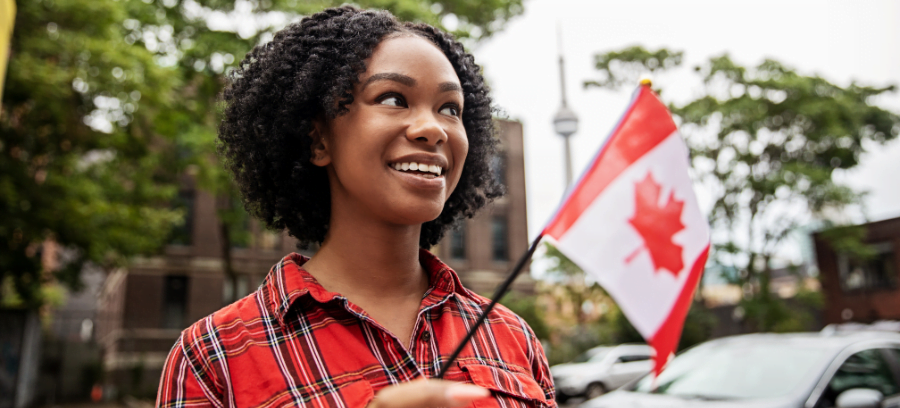Thinking of moving to Canada? You might have come across the term Canadian COPR. It’s short for Confirmation of Permanent Residence, a key paper in Canada’s immigration steps. But, what is it exactly, and why does it matter so much?
Let’s navigate the world of Canada’s COPR. We’ll learn all about it, what happens after you receive one, and its connection to obtaining Canadian permanent residency.
What is Canadian COPR?
Canada’s COPR (Confirmation of Permanent Residence) is a paper given by Canada’s government. This paper is given to people who can now stay forever in Canada. If you get this paper, it shows you can live and work in Canada permanently.
This paper holds key points like your identification, picture, immigration type, and more private details. You will use the COPR for your arrival in Canada, proving your status as a permanent resident. Imagine it as your certified pass to start fresh in Canada!
Why is Canadian COPR Important?
The Canada COPR is more than a document. It’s your gateway to becoming a permanent resident in Canada. It’s a must-have in finishing the landing process, your last hop into permanent residency. This paper certifies that the Immigration, Refugees, and Citizenship Canada (IRCC) officially recognizes you as a resident.
The COPR holds importance for jobs such as applying for a PR card, securing a SIN, and setting up a bank account. Therefore, taking care of your COPR and maintaining its status is key in your Canadian settlement process.
Steps After COPR Canada: What to Do Next?

Once you’ve received your Canadian COPR, you may wonder what comes next. Here are the essential steps after COPR Canada:
Landing in Canada
When you get your Canada COPR, you have to land in Canada before it expires. Take this paper with you when you come to a Canadian entry point (airport or land border). A Canadian immigration officer will check who you are, look at your COPR, and mark it. This proves you’re officially a permanent resident.
Applying for a Permanent Resident Card
Once you’ve arrived, a key task post-COPR Canada is getting into the process for your Permanent Resident (PR) card. This PR card is your official ticket when entering or exiting Canada. The rule is, you have to apply within 180 days after arrival. The card is good for a five year period and should be renewed prior to running out, especially if a long-term stay in Canada is on your roadmap.
Obtaining Your Social Insurance Number (SIN)
One key phase you need to cross is to secure a Social Insurance Number (SIN). This number is needed for jobs in Canada, for tax purposes, and to use government services. After arriving, you can submit your SIN application at a Service Canada spot.
Health Insurance and Other Documentation
Congratulations on your permanent residency! You are now eligible to use health services in Canada. Keep in mind, each area has unique rules, so get your health card straight away. You’ve already passed the Canada immigration medical test – an important step! This test says you’re healthy by Canada’s standards, which keeps everyone safe. Once you have your health card, move onto your next tasks, like finding a home, setting up a bank account, and if you don’t have a job yet, start job hunting. This will help you ease into your new Canadian life.
Finding a Settlement Service
Relocating to a fresh place pumps adrenaline, yet it can baffle. Luckily, tons of settling-in options in Canada exist to aid fresh faces. Firms such as Immignation provide custom help throughout your moving adventure. From visa advice to services after arrival, they guarantee you aren’t alone as you blend into your novel life in Canada.
What If Your Canadian COPR Expires?
Unexpected hold-ups might stop you from arriving in Canada before your COPR runs out. If this occurs, keep calm. You’ll need to ask IRCC for more time, but have a good excuse ready, like travel bans or personal events. If you don’t tell IRCC and your COPR ends, you’ll probably have to apply all over again. That’s why meeting deadlines is so important.
Immignation offers consultation services that can guide you through scenarios like this, helping you avoid pitfalls that might delay your journey.
Common Challenges After Receiving Canadian COPR
Earning your Canadian COPR is a major step. Yet, hiccups can surface. Lots of immigrants tackle issues such as navigating the job market in Canada, adjusting to a different culture, and understanding healthcare and education. Landing a job can be a tough cookie, all due to the need to grasp the unique job market in Canada, differing from your homeland. But, with proper planning and help, you can indeed launch and excel in your fresh Canadian life.
Immignation aims to make the move easier for newcomers. It offers useful tools such as help finding work, planning schooling, and advising on housing. This can be a lifeline for those who feel overwhelmed or uncertain about their next steps after arriving in Canada.
Understanding the Validity of Your Canadian COPR and Expiration Guidelines
A Canadian COPR usually lasts a year. It often matches your medical test or visa date. You must get to Canada before it expires to secure your permanent resident status. If your COPR runs out before you land in Canada, you might need to ask the IRCC for more time. You’d need good reasons, such as problems with travel or health. Missing the deadline might mean you have to apply again. Immignation gives top-notch help to make this process easy and prevent hold-ups in your immigration journey.
The Role of Immignation

Making your way through Canada’s immigration system might feel like a maze. Yet, Immignation makes it simpler, giving you guidance at every turn. From the first step of getting your visa to the after-arrival journey, they leave nothing uncertain. Here’s what Immignation does for you:
- Visa Consultation: If you’re considering Express Entry, a Provincial Nominee Program (PNP), or the Canadian COPR, Immignation provides customized guidance to help you select the right route.
- Document Preparation: Getting ready for the Canada COPR requires plenty of forms. Immignation makes sure everything’s correct, so there’s less chance of mistakes slowing down your application.
- Post-Landing Services: Immignation’s post-landing services cover everything you need after you land in Canada. They help with locating your new home, getting utilities up and running, and even take care of details like setting up bank accounts. Need to register for healthcare? They’ve got it. Searching for job openings? They’re on it.
These services make it simple. After getting your Canadian COPR, concentrate on starting your life in Canada! No need to sweat the small stuff and figure everything out by yourself.
Getting the Canada COPR is a huge achievement for most. It’s hard-earned and marks the start of a fresh journey. Immignation is by your side, leaving nothing to risk throughout your whole immigration journey.
Immignation is all about guiding you to the perfect immigration program and offering support once you’re in Canada. In collaboration with seasoned consultants, the daunting intricacies of the Canadian immigration process suddenly become clear, manageable, and completely stress-free. Turning your Canadian dream into a reality is our absolute priority.
Applying for a Permanent Resident card? Or setting up your Social Insurance Number? Maybe you need help settling into Canada? Immignation has got you covered with customized support designed just for you.
Conclusion
Getting your Canadian COPR is a pivotal moment. It’s the start of your new life in Canada. Knowing what this paper is and what to do after getting your COPR can make moving there easier for you.
Working with a seasoned immigration agency such as Immignation is a great way to smooth out your transition to Canada. The path from starting your visa application to feeling at home in a new country is made easier with their help. They offer multiple services. These include visa advice, handling paperwork, and assistance once you’ve arrived. The whole immigration process becomes less of a burden.
Thinking about settling down in Canada for good? See how Immignation might help you fulfill your Canadian dream. For additional details on moving to Canada, the official IRCC website is a great resource. If you’re keen to understand how Immignation could be your companion on your journey of immigration, click this link.
FAQ’S
Does COPR mean I am a permanent resident?
Indeed, getting your Canadian COPR signifies your approval for permanent residency. Yet, you officially turn into a permanent resident upon your arrival in Canada and after the entire procedure is done.
What to do once you get your Canadian COPR?
Once you’ve got your Canadian COPR, make your initial arrival in Canada. Don’t forget to request a PR card, obtain a Social Insurance Number (SIN), and sign up for health insurance. All this will make your settling easy peasy.
How long does it take to get Canadian COPR?
Getting your Canadian COPR isn’t immediate. Usually, it’s a few months after your application gets a thumbs up. This wait time can change based on how fast things get done and what’s unique about your case.
What is the difference between PPR and COPR?
A request for your passport, known as PPR, is made for visa stamping purposes. Meanwhile, a document called COPR or Confirmation of Permanent Residence verifies that you are a permanent resident, given after approval.

